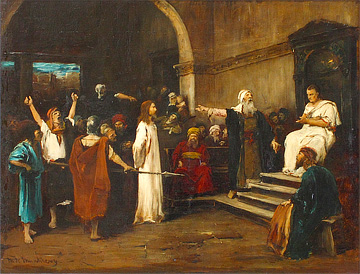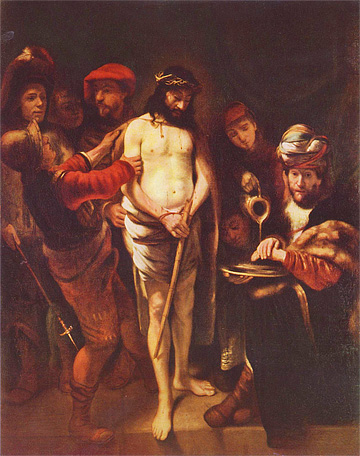logical/chronological order, visit this link:
Why Did Jesus Have to Die?
Roman, Jewish, and Christian Perspectives
In my last two posts in this series on the death of Jesus, I offered a picture of Pontius Pilate and described the unique dangers he faced in Jerusalem during the Jewish celebration of Passover. In light of this background, today I’ll examine the biblical account of Pilate’s interaction with Jewish leaders.
Pilate’s Encounter with Jesus and the Jewish Leaders
Early on Friday morning, after Jesus of Nazareth had entered Jerusalem, Pontius Pilate was awakened by a group of Jewish leaders who had brought Jesus to him with the intention of having Jesus crucified. They accused Jesus of “perverting our nation, forbidding us to pay taxes to the emperor, and saying that he himself is the Messiah, a king” (Luke 23:2). When Pilate questioned Jesus, the accused was strangely quiet. Finally the governor cut to the chase. “Are you the king of the Jews?” he asked. “You say so,” was all Jesus said in reply (Luke 23:3). When Pilate mentioned to the Jewish leaders that their charges against Jesus weren’t persuasive, they added, “He stirs up the people by teaching throughout all Judea, from Galilee where he began even to this place” (Luke 23:5). It’s likely that this was not news to Pilate, who had probably been following the unusual exploits of Jesus for some time. Roman governors kept an eye out for Jewish prophets who announced the coming of God’s kingdom. (Photo: Mihály Munkácsy, Christ in front of Pilate, 1881.)
 Once the Jewish leaders had brought Jesus to Pilate, the question of his fate lay in the governor’s hands. Certainly he could follow the recommendation of the leaders, including the high priest, Caiaphas, whom he had appointed. But killing Jesus had a considerable downside. Pilate was surely aware of Jesus’ popularity among the people. He might even have known before Friday that the Jewish leaders were trying to do away with Jesus, but were reticent to do so because he was so popular with the people. Killing Jesus might well have incited the people to riot (Mark 14:2), something neither the Jewish officials nor Pilate would have wanted. If Pilate were perceived by the people as the one responsible for the death of their popular prophet, then he might end up causing a ruckus or even a revolt that could very well lead to his own downfall.
Once the Jewish leaders had brought Jesus to Pilate, the question of his fate lay in the governor’s hands. Certainly he could follow the recommendation of the leaders, including the high priest, Caiaphas, whom he had appointed. But killing Jesus had a considerable downside. Pilate was surely aware of Jesus’ popularity among the people. He might even have known before Friday that the Jewish leaders were trying to do away with Jesus, but were reticent to do so because he was so popular with the people. Killing Jesus might well have incited the people to riot (Mark 14:2), something neither the Jewish officials nor Pilate would have wanted. If Pilate were perceived by the people as the one responsible for the death of their popular prophet, then he might end up causing a ruckus or even a revolt that could very well lead to his own downfall.
Yet Pilate would surely have preferred to get Jesus out of the way somehow. Though he was not seditious in the ordinary sense – Jesus carried no weapons, organized no army, and had not assaulted any Roman authorities – nevertheless the Nazarene was clearly a rabble-rouser from Pilate’s point of view. And even if he didn’t explicitly espouse the overthrow of Rome, he certainly flirted with the seditious language of kingship.
Two other factors contributed to Pilate’s reticence to execute Jesus. First, his interaction with Jesus convinced him that the Galilean was no ordinary insurrectionist. It’s hard to reconstruct from the Gospel accounts exactly what Pilate thought of Jesus. If he truly believed him to be innocent and no threat to Rome, then it’s unlikely that he would have had Jesus crucified. But, Pilate must have seen that Jesus was in a completely different league from the others he had crucified. (Of course I’m aware that Christian tradition paints Pilate as a truth-seeker who genuinely believes in Jesus’ innocence. But this image doesn’t fit what we know about Pilate from history, not to mention the indisputable fact that Pilate himself was, in the end, responsible for Jesus’ death. It’s very hard to imagine that Pilate was bullied, either by Jewish leaders or by the mob, into doing something that he really didn’t want to do. I believe that many of the statements in the gospels that seem to reflect the “noble Pilate” were in fact originally spoken by the governor in order to incite the Jews to accept greater responsibility for Jesus’ death, thus exonerating Pilate in the eyes of the people. Or, in other cases, I believe Pilate’s tone was ironic or sarcastic. When he asked Jesus, “What is truth?” Pilate wasn’t beginning a philosophical dialogue, but simply mocking Jesus, who had just spoken of “belonging to the truth” (John 18:37-38).
The second factor that contributed to Pilate’s reticence to execute Jesus was a recommendation from his wife that he should “have nothing to do with” Jesus. Pilate’s wife claimed to have “suffered a great deal because of a dream about him” (Matthew 27:19). Pilate, like most pagans, was in all likelihood quite superstitious, and his wife’s nightmare would have spooked him as well.
From Pilate’s perspective, what would have been the best outcome of this whole mess? Somehow get Jesus to stop causing trouble, but without inciting the people to riot. If silencing Jesus required his death, then so be it, but let it be someone else’s fault other than Pilate’s. If Jesus could be shut down by some other means – like flogging – then this would also be an acceptable option.
In my next post I’ll finish explaining the necessity of Jesus’ death from the Roman perspective of Pontius Pilate.

